This post may contain affiliate links. Please read my affiliate policy.
Recently, I stumbled across an article that talked about toothpaste ingredients and the issues they can actually cause rather than prevent— and it startled me. I know there are TONS of natural toothpaste companies out there nowadays… yet they’re a bit pricey. If I can make something simple + effective at home for a fraction of the price, why not? Here’s my very own homemade toothpaste recipe… full of only the good stuff.
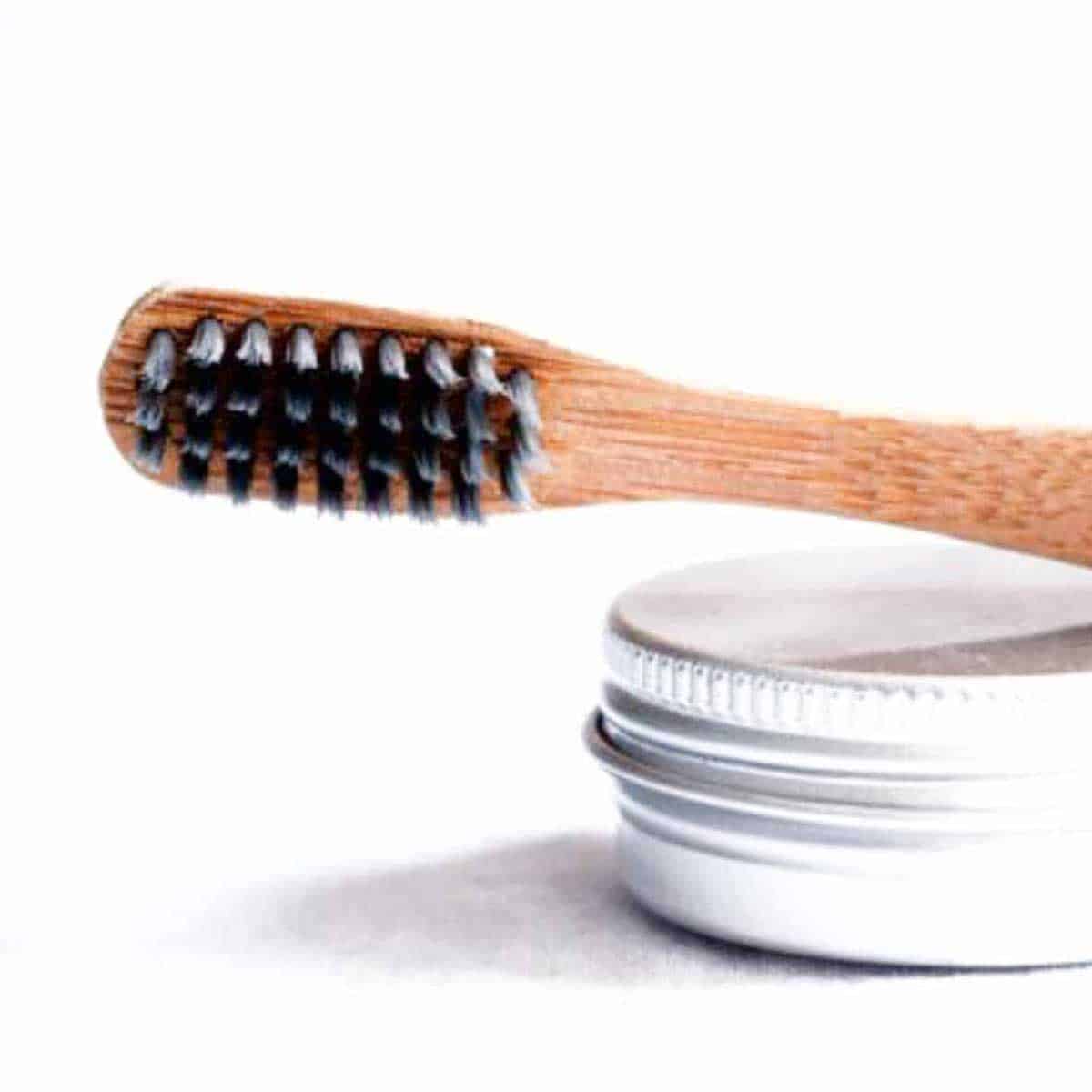
I can honestly say this is the best natural toothpaste I’ve tried, and that’s saying something since I’ve been on the hunt for a great option for a while!
Note: There is no fluoride in this recipe. Depending on your stance with this, feel free to add in a fluoride product or use a fluoride mouthwash afterwards.
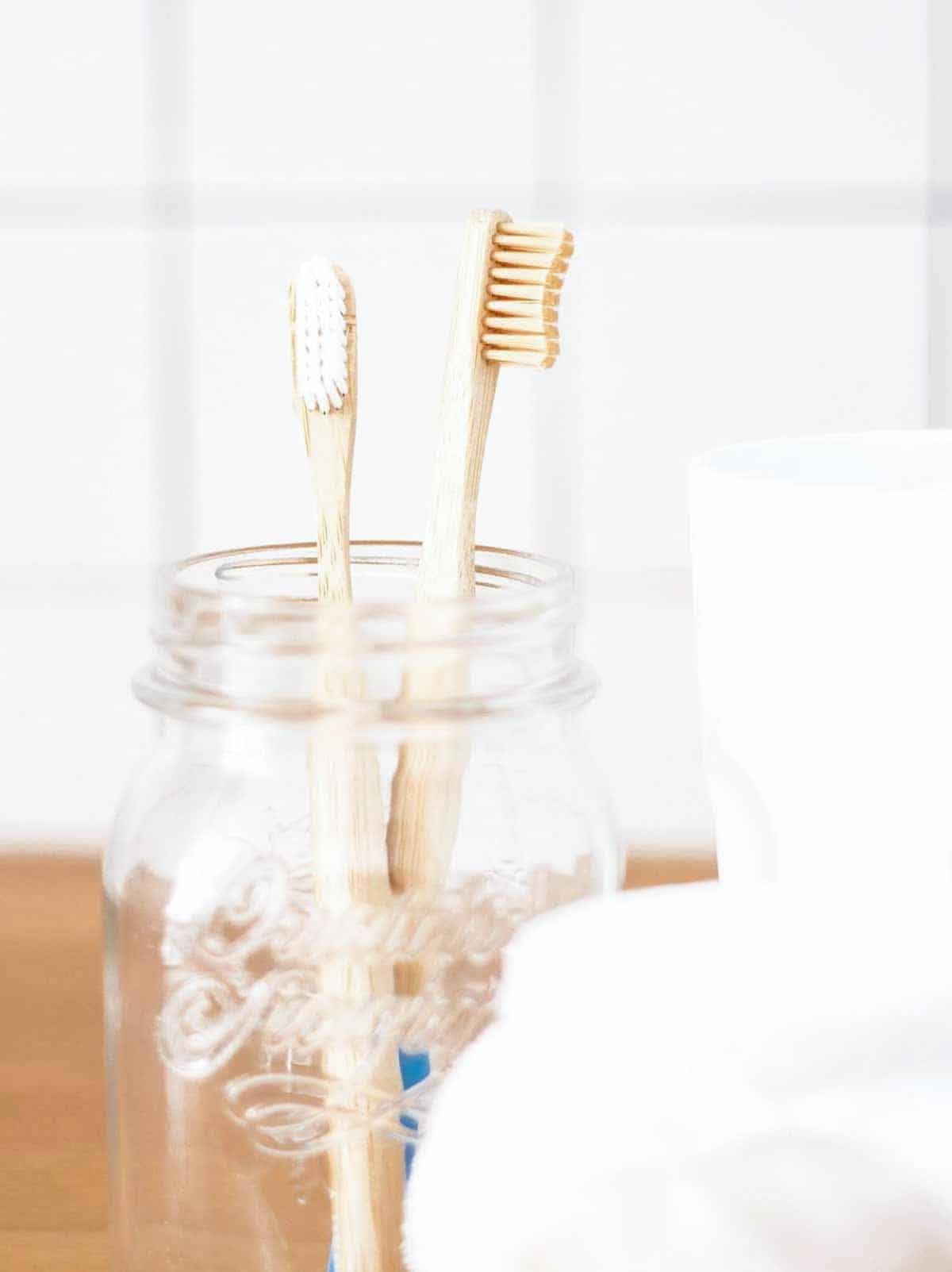
Common toothpaste ingredients
Two ingredients that have a pretty bad wrap are:
1. Glycerin: It gives toothpaste a nice creamy texture and coats the teeth for “protection”, yet at the same time it also stops re-enamalization (so cavities can’t self-heal.)
2. Sodium fluoride: A by-product of aluminum manufacturing that is found in rat poisons and industrial pesticides).
Scary stuff, huh? Well, rather than freak out about it every time I brush my teeth, I decided to make some homemade toothpaste sans weird stuff. And yes— I threw in some wonderful coconut oil that I’m beyond obsessed with and it’s millions of effective uses.
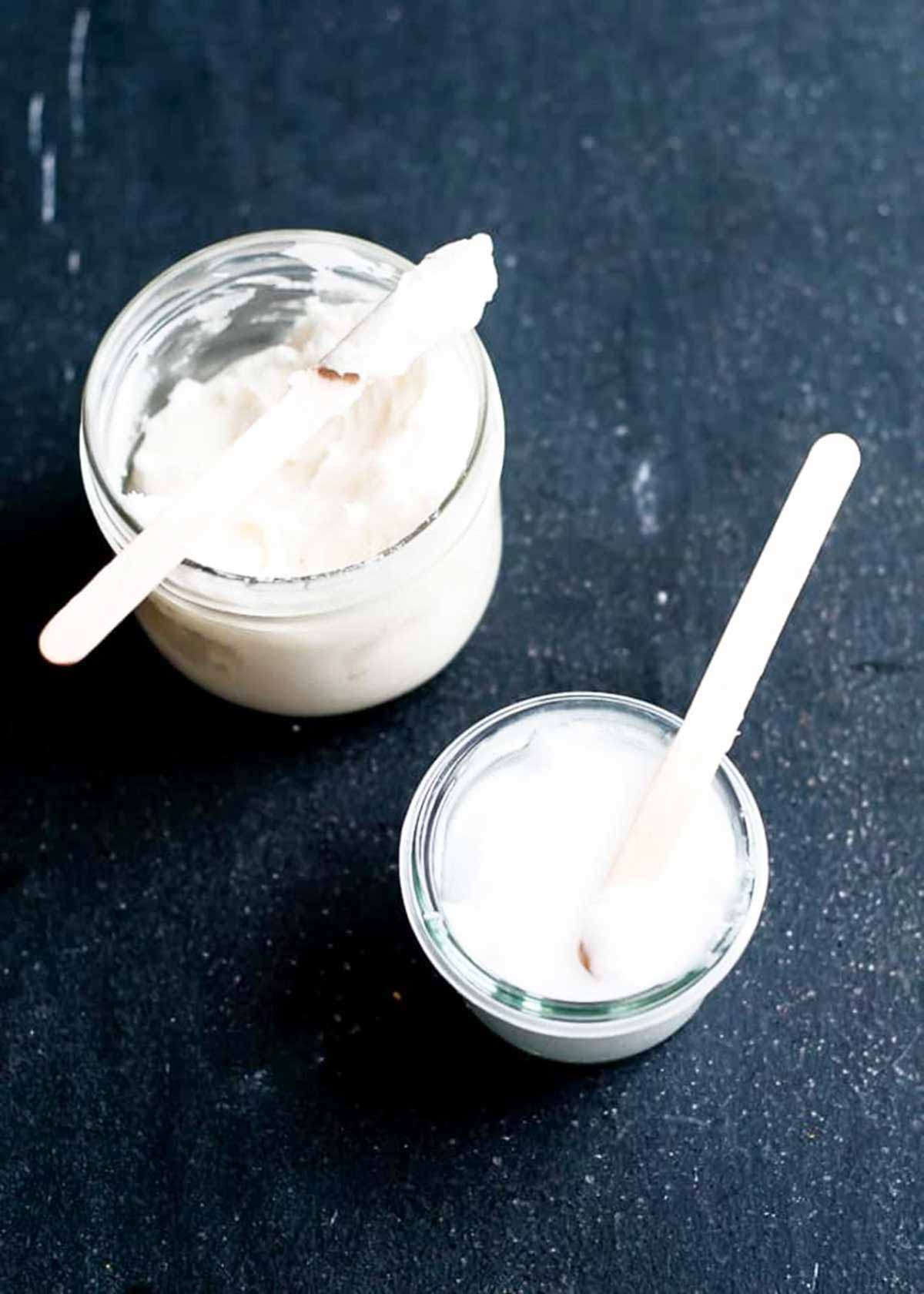
Natural toothpaste recipe
Once I started experimenting with a homemade toothpaste recipe, I was pleasantly surprised to find out how few ingredients I actually needed. My recipe has 4 ingredients, with an optional 5th if you add in activated charcoal. Not only is this recipe simple, it contains only plant based ingredients that are common. No weird chemical compounds or additives here!
When whipping up a batch of this homemade toothpaste, I typically triple the batch. That way each bathroom has its own container, so there’s no family fights over the jar. To keep the ingredients light and airy, I use an immersion blender rather than mixing with a blender or food processor.
Antibacterial essential oils
If you choose the right essential oils, then you can create a strong antibacterial toothpaste. I suggest these essential oils, which I typically purchase from Plant Therapy:
- Grapefruit Oil
- Peppermint Oil
- Tea Tree Oil
- Orange Oil
- Lemongrass Oil
I am thrilled to have found a homemade toothpaste replacement that I actually enjoy using as well as have fun making. I like that I can tweak the recipe depending on my personal preference at the time (sweeter, minty, fruity, etc— it’s all about what essential oils I put in it). This summer I made a batch with grapefruit oil and it has a citrus-tang to it, which was refreshing. Now I am using eucalyptus oil and I love the minty taste.
How to store DIY toothpaste
I like to store homemade toothpaste in a wide-mouth mason jar or leak-proof metal tin. Use a popsicle stick to dip into the toothpaste and and then spread your toothbrush. You can also use a squirt bottle and cut a wide tip on it to help it come out.
Homemade Dog Toothpaste
YES… I made this recipe for me and my family… yet it also works with dogs! Since my sweet dog (Barrett the Huskador), cannot resist licking and swallowing everything in his face, I made this for him too. Since they are completely natural ingredients, there’s no harm if he licks it while I brush.
Other DIY recipes
If this natural recipe has piqued your interest in more natural products you can use in your home, then I’ve got some more great recipes for you. These recipes are plant based versions that seriously work, just like this homemade toothpaste recipe:
- Homemade chest rub
- Fire cider
- Ginger lemon honey tea
- Homemade deodorant
- Elderberry syrup
- Anti-inflammatory smoothie cubes
- Bloat-fighting smoothie
- DIY lip scrub
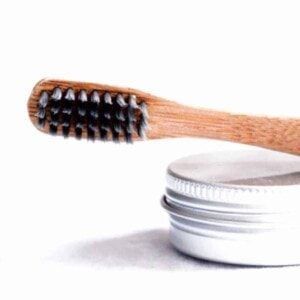
Homemade Toothpaste Recipe
Ingredients
- 6 tablespoon coconut oil, unrefined
- 6 tablespoon baking soda
- 25 drop essential oil eucalyptus, grapefruit, peppermint
- 1 teaspoon stevia or more if you like it sweeter
- activated charcoal optional
Instructions
- Mix all ingredients together in a bowl. I used my to whip it really well and give it a light creamy texture.
- Pour into a mason jar and seal it up until ready to use.
Notes
- Getting it out of the mason jar can be an adjustment. Use a popsicle stick to dip into the toothpaste and spread nicely onto the toothbrush. You can also use a squirt bottle (you will need to cut the pointed tip wider).
- Adding activated charcoal can be a gentle way to whiten your teeth.

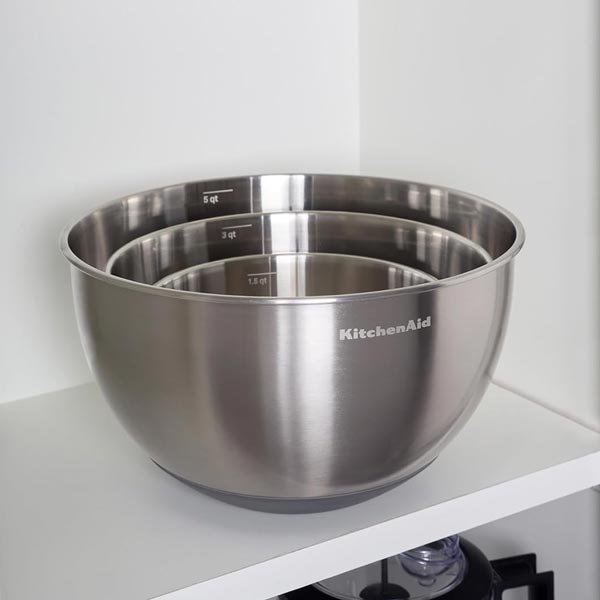
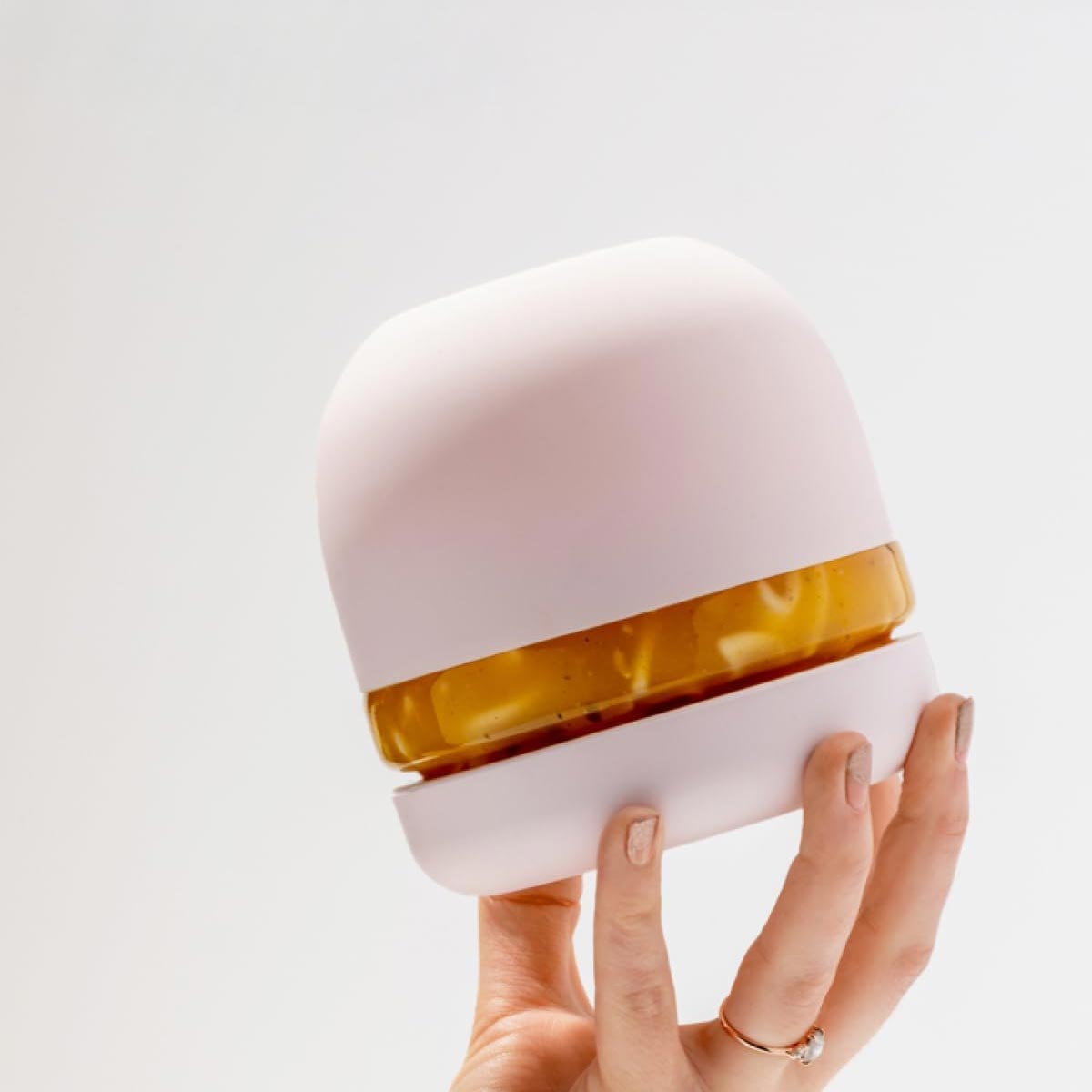
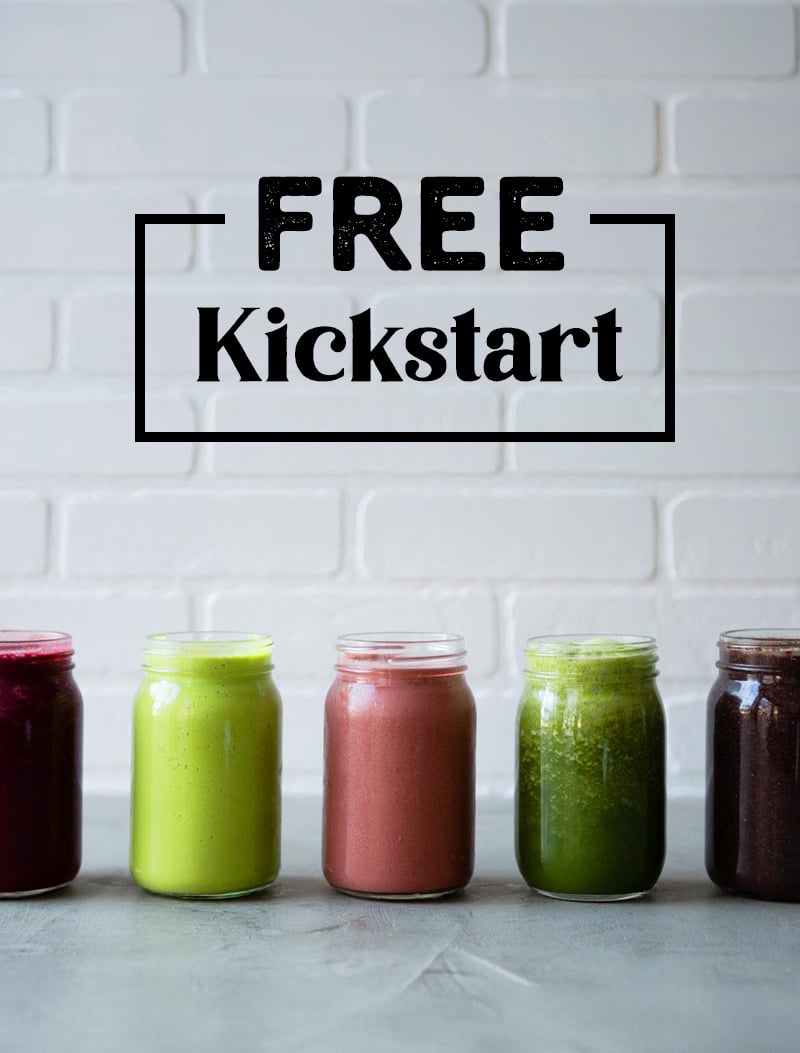









Hey, I am looking forward to make this recipe! I do have a question about the use of stevia. I have no experience with this and I am unsure whether to use the green stevia (plant material) or extracted powder. The latter does not seem to have a very good rep. Did you do some research on this? Thank you!
I don’t know much about stevia but I would say choose the one that is the least refined/processed. It’s simply used to add a bit of sweetness to your toothpaste so it’s an optional ingredient and you can leave it out altogether if you choose.
50% baking soda is way too much, especially to use on a daily basis. You might want to look this up and rethink it because it can have a deleterious effect on tooth enamel.
Thanks for joining the conversation, Leslie. We encourage everyone in our community to educate themselves on what they put in/on their bodies and we realize there is no “one size fits all” solution.
If essential oils are not for ingesting why are they being used for toothpaste?
Some essential oils are ok for internal use. Make sure you check the label/information before you add EO to your toothpaste to make sure it’s one that is ok to use internally.
I use Young Living Vitality essential oils. Young Living Vitality oils are for ingesting.
Hi,
I really would like to try this out after reading about the dangers of ingredients in store-bought toothpaste.
Do we need liquid or solid coconut oil for this?
Thanks
Hi Ishana, you’ll want to use the type of coconut oil that’s solid at room temp.
Hi,
I am very interested to use your recipe. How long have you been using this? Do you use this at least 2x a day everyday? Any health/dental problem encountered?
Hi Ryan! I believe Jen’s been using this toothpaste for a while now. She switched to homemade toothpaste to avoid health and dental problems that can be caused by store-bought toothpaste. 🙂
Xylitol from birch bark (not from corn) could be used instead of stevia since stevia has an after taste. Xylitol is excellent for killing bad bacteria. Just a gentle suggestion ! Thank you so much for sharing this recipe
Great suggestion Michele!
I love this recipe!
That’s great, Nita! 🙂
Hi
Tried recipe today. Its wonderful. Purchased some coconut oil tooth paste on HSN loved it haven’t seen it on again.
So decided to look on line for recipe. When in and brushed my teeth right away and loved it.
Thank so much
Thank you for the great review, Sonja! So glad you loved it. 🙂
Where should we spit coconut oil toothpaste? Should it go down the sink or into the trash? I don’t want to clog my sink drain.
Hey Marci,
I usually spit it into my trash. It isn’t much coconut oil but I wouldn’t risk it spitting it into your sink.
I was so excited when I saw this recipe on facebook. For the past 5 or 6 months everything burns my tongue. I can’t use toothpaste because the mint burns the crap out of my tongue. I can’t use mouthwash because of the mint and chemicals. I can’t have anything carbonated, or minty, or spicy, No citric acid, so no citrus fruit or juices. So, I’m definitely making this tonight.
I found an article by a Canadian scientist. I have something called burning mouth disease. Along with all my other auto-immune crap. He suggested taking Alpha Lipoic Acid, Vitamin B Complex. It actually worked fairly well, but I’m thinking the coconut oil toothpaste will really help! I’m going to try the coconut oil pull too! Wish me luck!
Hey Melissa,
Thank you for your comment! I really hope our recipe for homemade toothpaste works for you and gives you what you need without the burning. That sounds so difficult to deal with.
Let us know what you think once you give it a try!
Hi I also have burning mouth syndrome, now in my 7th year. I have tried everything, numerous doctors, medications, different toothpaste, have tried cutting out all sorts of foods, no sugar, coffee, dairy, certain fruits, spices, salt and alcohol, nothing has helped. i am desperate, I will certainly try this recipe for toothpaste. Hope it’s the answer
I hope so too, Michel.
I have had Burning Mouth Syndrome for 5 years and have gone to oral pain pathologists and The Center for Complex Diseases in San Jose. I have spent $17,000 out of pocket but NOTHING helps. The only time my dry mouth isn’t on fire is when I’m eating. The main thing is to eat whole food so that your immune system is as strong as possible. You may also want to investigate Mast Cell Activation and SIBO, small intestine bacterial overgrowth. This is a little known syndrome but millions of us have it, more women than men. I mention this here so we can all keep our ears open for each other. Meanwhile, eat well.
Thank you for sharing your story, Janice. It’s great when members of our community can help each other and share information.
Thank you for the recipe, I plan to try it out. I noticed that you just said “coconut oil” – but that can be problematic, because when brushing teeth at a washbasin (the usual place!) it can eventually give rise to clogged drains. This is something I read elsewhere, so I think it would be better to use fractionated coconut oil, so it would be safe for plumbing.
Hey Riana,
Thank you for your comment! What I do is I spit the toothpaste out in my garbage can. That way I do not have to worry about my pipes. Hope that helps!
I’ve heard it’s unsafe to ingest essential oils, even if diluted with a carrier oil. What are your thoughts? Is there a digestible kind, I have yet to find one :/ also, what about cinnamon oil or peppermint oil used for cooking in replacement to essential oils
Hey Lauren,
There are tons of controversy when it comes to essential oils and how we should or shouldn’t use them. We here at Simple Green Smoothies know they are beneficial to us but if you are worried I would suggest asking your doctor about it. We love Dr Axe and he talks a lot about essential oils and how great they are for you. He even has his own toothpaste recipe as well. Also, the best essential oils to use in a toothpaste should be antibacterial and they are peppermint, tea tree, spearmint, and clove.
Hope that helps!
In summer the coconut oil is like water. What should I use to thicken it?
I would try either storing it in a cooler area like your fridge maybe? Or you could always add in some extra baking soda to thicken it up.
Hope that helps!
What size mason jar are you using for this?
Hey Liana,
For this recipe we are using an 8oz wide mouth mason jar.
Awesome! You can also order 10oz jars of coconut oil from brandless.com for only $3!
Hey Robyn,
Thank you for sharing that awesome tip! We hope you enjoyed this recipe for all natural toothpaste 🙂
Hi,
I’m planning to make this toothpaste tomorrow and was wondering whether the stevia is a must? Could I make it without any sweetener??
Thank you!!
Hi Sasha,
You can totally leave the Stevia out, it’s just a little added sweetness for your toothpaste!
That’s great! No stevia or sweetners for me either. I practice intermittent fasting and avoid any type of sweetness hitting my tongue during my fasting period.
What brand of essential oil did you use and where did you get it from
I use a variety of brands. I really like Mountain Rose Herbs, Plant Therapy and Ancient Nutrition has a line now too you can buy online. Those are my go-to’s.
What is the ‘shelf life’ of this mixture
Hi Chris,
There actually isn’t a shelf-life end date. Well, I’m sure they do at some point, but not for a long, long time. I’m sure you’ll use up the toothpaste long before it ever “expires.” There’s no water added to the recipe, which means there is no breeding ground for bacteria to grow either.
Hi. Love making my own products, it’s empowering! Particularly as I age. I like your recipe, I also use clay from herb store (also for face masks) and less baking soda. Please share research regarding pure glycerine and re-enamilization. I love sweetness and texture of glycerin.
Hi Lola! So glad you like this recipe. I think you mean “remineralization” and we have a link to a great article that talks about healing teeth naturally. I encourage you to read it. You can find the link in the body of this article or you can copy + paste this into your browser:
Hi Lola, do you mean you added clay to this recipe to use less of the baking soda? Would love to try that. Never worked with clay though. What kind of clay did you use?
How about tee tree oil? And given how “potent” it is, if used, I presume I’d use less of it?
Hey Mila. Tea tree (a.k.a. melaleuca) essential oil is one of the EOs that should never be taken orally. If swallowed, it can cause serious symptoms. It’s meant for topical use or diffusion only. Do not use tea tree oil in homemade toothpaste.
I was wondering what the ph level is of your homemade toothpaste?
Hi Carolyn,
I’m not 100% sure on the total PH level, but I do know that baking soda has a pH of 9 to 11 (alkaline), so it helps to neutralize acids while not being too abrasive to teeth.
Want to check your homemade tooth pastes PH level before brushing? Pick up pH strips from Amazon to test the acidity of any homemade toothpaste. Anything you make and use should ideally have a pH of 7 (neutral) or higher.